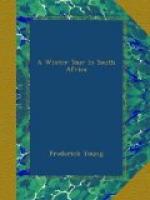At the Nooitgedacht Mine I saw the process performed of pan washing of the previously crushed quartz. I also went to the stamping house, where a machine for crushing has been erected of twenty stamps. I inspected the mine generally, and its various shafts already sunk. The work appeared to me to be well and systematically conducted. Before leaving this mine the great gold cake lump, weighing 1,370 ozs., which was being forwarded, the day I was there, to the Paris Exhibition, was put into my hands. It seemed a wonderfully big lump of the precious metal, which is so earnestly sought for by every race of civilised man.
I also went over another mine, at present in the early stage of its development, but which struck me as being conducted, as far as the working management was concerned, on good, sound, business principles—belonging to the Klerksdorp Gold Estates Company.
My stay at Klerksdorp much impressed me with the idea of the future of this town of yesterday’s growth. It is only fifteen months ago, (a little more than a year) that the whole of the town on the side of the stream where the Union Hotel is situated, was begun. The inhabitants already number some thousands; and the indications I have seen in the mines, of great prospects of gold being found in large and payable quantities, are very strong. Klerksdorp may yet become a second Johannesburg, whose remarkable and rapid development I was told, would astonish me.
[Illustration: Decorative]
Potchefstroom.
After leaving Klerksdorp, we travelled the next day in our wagon thirty-two miles, halting for the night at Potchefstroom, which is not only one of the oldest, but one of the most important of the Transvaal districts. Recently the presence of gold-bearing reefs has been demonstrated in many parts of the division. On our way we passed, during the afternoon, a spot on the road where a flock of not less than fifty of those unclean birds, vultures, were hovering over and around the carcase of a recently dead bullock. These birds are the scavengers of this part of the world; they feed greedily on carrion, and rapidly pull a dead animal completely to pieces, leaving only the bones, which afterwards lie bleaching on the Veldt, to mark the spot where it has fallen in death—whether it be either horse, or mule, or bullock—left to die, worn out with fatigue by its unfeeling owners.
Before leaving Potchefstroom, the next morning, I paid a hasty visit to the Fort and Cemetery, rendered so tragically historical in connection with the Transvaal war. It was here that my lamented friend, the late Chevalier Forssman, was shut up with his family for ninety days, and lost during the siege, two of his children, a son and a daughter. I was much struck with the picturesque appearance of Potchefstroom. It has a population of about 2,000. Another long two days’ journeying of about sixty-four miles, through a prettier country than the wide wilderness of the boundless and treeless plain, we had hitherto passed through in the Western part of the Transvaal, brought us to Johannesburg.




